
IkamvaYouth learners from township and rural schools achieve 85% pass rate; 42% of which are bachelor passes.
“Today my life begins and I’m so happy” – Anathi Malindi, Grade 12 learner from Nyanga.
Speaking on SAFM on 4th January, Graeme Bloch said that “you have to go to a model c school if you want to do well in matric”. And although the country is celebrating the 70.2% national matric pass rate, analysts agree that this figure masks the inequalities in achievement and access to tertiary study. With learners at township and rural schools severely under-performing, it appears that the higher the school fees the better one’s chances of academic achievement.
Yet IkamvaYouth’s volunteers and learners have once again shown that excellent results are possible, irrespective of which school one attends. There were 100 Grade 12 learners enrolled at IkamvaYouth in 2011, and of the 85% that passed, 42% obtained bachelor passes. This is remarkable given that only 24.3% bachelor passes were achieved nationally; the far majority by ex-model c schools. Two Western Cape branches with their first grade 12 classes did particularly well (Masiphumelele achieved 96% pass; Nyanga 93%), and the Ivory Park branch led the pack with a 100% pass rate). Overall, 70% of learners have achieved the bachelor or diploma passes they need to access tertiary education.
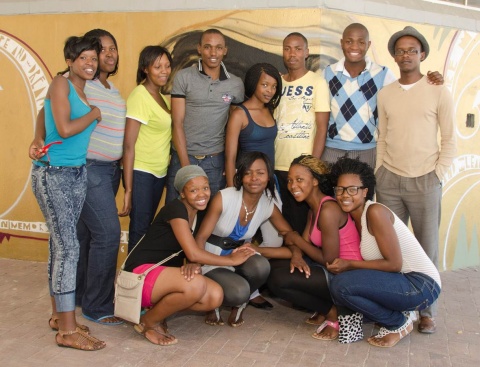
Matriculants at Makhaza Branch, Khayelitsha
IkamvaYouth sets no academic pre-requisite for enrollment in the programme. Most learners join with abysmal academic results and are from impoverished homes with unemployed caregivers. During their time with IkamvaYouth, learners dramatically improve their results, access tertiary education, and as Portia Dlamini’s mother in rural KZN hopes, will be able to “carry the family out of poverty”. Many ikamvanites excelled (25 distinctions overall) and – most importantly – many showed significant improvement. “When I joined IkamvaYouth, my third highest mark was 64%, and today I’ve achieved 5 distinctions”, said Shelton Chadya from Ivory Park. Tshepo Lesejane effectively doubled his maths literacy result (39% when he joined; he matriculated with distinction).

Gauteng Branch celebrating Matrics with Branch Coordinator Joe Manciya
Although celebrating the results, IkamvaYouth’s work with the class of 2011 is far from over. 80% of the learners who failed are eligible for supplementary exams, and tutors will ensure that they’re ready to succeed in these exams in March. While many of those who passed have already been accepted by the country’s top universities, there is still work to be done to ensure that none of the class of 2011 become unemployed. The next step is ensuring that all these learners access tertiary education, training, internships, learnerships or employment. “IkamvaYouth will continue to support all our 2011 matrics as they access quality post-school opportunities and become tutors; enabling the following years’ learners to do the same,” says director Joy Olivier.
The tutors who help the learners to reach these heights are all volunteers. Most are university students and many are ex-learners from IkamvaYouth. They’re also the organisation’s greatest benefactors: next year, ikamvanites will be delivering the equivalent of over 3 million rands’ worth of tutoring time to learners in seven communities in three provinces. The result of this phenomenal investment is an intensive, high quality programme that offers ongoing individual attention and support to learners for under R4500 per learner per year.
As well as our volunteers gratitude must be extended to our funders and donors. In particular IkamvaYouth is especially grateful to the DG Murray Trust, EMpower, the Raimondo Trust, the Potter foundation, the Answer Series, ABI, Hatch, African Bank, Cato Manor ABM, AME Africa, the Anglo Chairman’s Fund, SEF, TSiBA, UWC, DUT, Department of Libraries and Information Science, Learning Trust, Bertha Foundation, Dietschweiler Stiftung, the Foschini Group, iKineo, Education Without Borders, World Teach, Zonke Monitoring Systems, and Capitec Bank for their vital contributions this past year. A great shout big shout out also goes to the countless individuals whose time and money has ensured that IkamvaYouth not only continues to operate in challenging economic times, but can grow and expand its reach and impact.
When announcing the results, the Minister of Basic Education pronounced the eradication of inequality a national priority. IkamvaYouth invites everyone to get involved in transforming our nation, one shining future at a time. IkamvaYouth has branches in the Western Cape (Khayelitsha, Nyanga and Masiphumelele); KZN (Chesterville and a new branch opening in Umlazi) and Gauteng (Ivory Park, and a new branch opening in Ebony Park). IkamvaYouth has maintained a matric pass rate of between 83 and 100% each year since 2005, and true credit for these results must go to the learners, volunteers, the branch teams, and the donors.
Congratulations Class of 2011!

As we continue to collect all the individual results from the IkamvaYouth Gauteng learners, three stories in particular stand out so far:
Shelton Chadya – 5 Distinctions

Shelton first joined IkamvaYouth during 2010’s protracted Public Servants strike as he sought out a place to continue studying while his teachers weren’t teaching. His determination and commitment to his school work has paid off handsomely in that he has jumped more than two symbols in 3 of the subjects he ultimately received distinctions for. Earlier this year Shelton also won his region’s Accounting Olympiad and with these skills he intends to study a BCOM at either WITS or UJ this year. Shelton has already been working with younger learners helping them improve their understanding of their school subjects and he is now looking forward to officially joining the IkamvaYouth volunteer team this year to help others follow in his footsteps.
Nombuso Ndala – 4 Distinctions
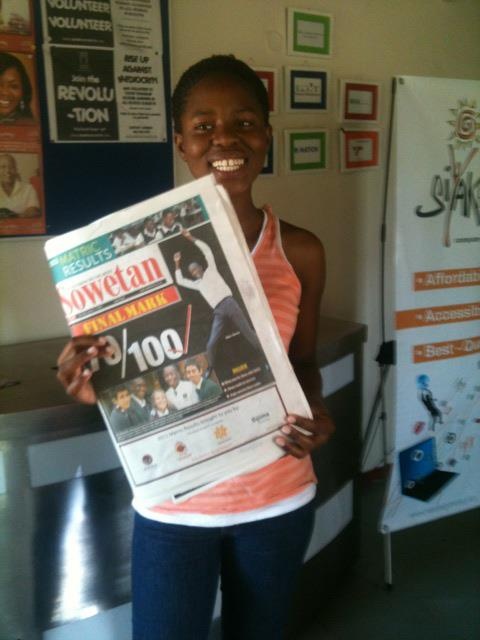
Nombuso has been part of the furniture at IkamvaYouth this year as she has used every opportunity to work on improving her understanding of her school subjects. Often Nombuso (sometimes with fellow Ikamvanites) could be found working in the matric room trying to solve difficult problems. Nombuso has made ample use of the tutoring sessions, the learning channel and the Answers Series booklets. On discovering how she had fared on the matric exams she had this to say, “I was so over the moon to receive my results and so happy. I immediately told my mom and she started crying. I worked so hard and practiced and practiced and practiced to get these results. I am so happy.” During her time with IkamvaYouth, in addition to her 4 distinctions, Nombuso also lifted her maths mark from 32% to 62% and intends to study a BCOM at Wits this year, her mother is unemployed.
Tshepo Lesejane – 1 Distinction
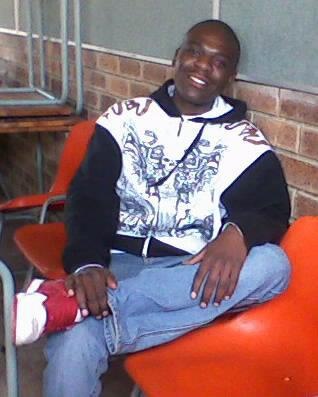
When Tshepo first joined IkamvaYouth he had 39% for Maths Literacy but after two years of intensive hard work and tutoring he managed to score a distinction (over 80%) in his matric exam. This means that Tshepo has more than doubled his Maths Literacy result in the two years that he has been with IkamvaYouth – a notable achievement indeed. Tshepo hopes to work in the media industry and to study media and journalism in 2012.
There are also further notable achievements from the individual results we have collected so far:
Masabatha Rambuwani scored a distinction in Life Orientation, 73% for English (second language) and went from 30% in Accounting to 72%. Thabang Simelane also scored a distinction in Life Orientation and went from 31% in Accounting to 56%. He also went from 14% in Pure Maths to 49% (which will be submitted for a remark in search of that elusive 1%).
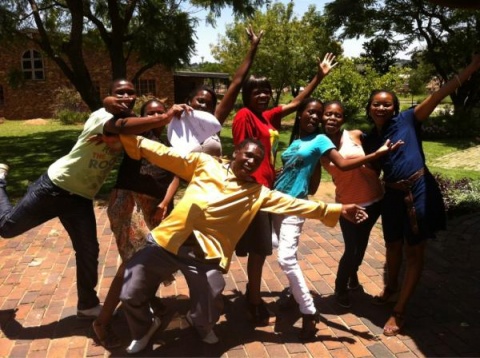
IkamvaYouth Gauteng learners celebrate with Joe and Zamo on receiving their results.

It is with much excitement that we can report on the results of our 2011 IkamvaYouth Gauteng matriculants. In particular, we are especially pleased to report a 100% matric pass rate for the first time in this branch’s history. Perhaps more importantly though it pleases us to report that half of these passes are Bachelor level passes, 40% are Diploma level passes and the remaining 10% are Higher Certificate passes.
Among the many happy success stories, two stand out so far: Shelton Chadya achieved a monumental 5 distinctions (his 3rd highest mark was 64% when he joined IkamvaYouth). Tshepo Lesejane also scored a distinction in maths literacy which is particularly impressive in that his maths literacy mark when he joined IkamvaYouth was only 39%. Tshepo has effectively more than doubled his results in 2 years with IkamvaYouth.
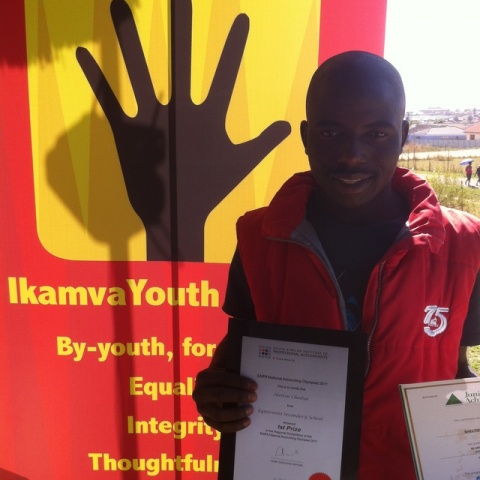
Shelton Chadya who scored 5 distinctions in his matric exams.
True credit for these results must go to our awesome learners, volunteers and donors and the branch team for pulling this all together. The learners have put in countless hours of hard work and study, the volunteers have continuously poured their hearts and souls into assisting our learners and the donors have provided the means for this to take place. In particular we are especially grateful to ABI, Hatch and African Bank for their contributions to the programme this past year.
All that is left is for us to toast the success of the IkamvaYouth Gauteng matrics and to celebrate these achievements in the days ahead. The next task is to ensure all of these learners get access to quality post-school opportunities in the next few months while we also officially open our new Gauteng branch to assist more learners.
Busy but exciting days in store.
I am currently about to start my third year at Amherst College a small liberal arts college in Western Massachusetts in the United States as a Black Studies and Women and Gender Studies double major and German as my language focus. This is a completely different path to the original plan I had in high school, which was to study accounting and eventually become a Chartered Accountant. I was fortunate enough to receive a scholarship from the Student Sponsorship Programme (SSP) in high school and SSP played a large role in my being where I am today not only for financial reasons but through help with University applications, career guidance and personal support. SSP also influenced my interest in working with the Center for Community Engagement (CCE) at Amherst College because even though I have a busy schedule as a fulltime student, I think it is important to help out where you can. Once I week I tutor at A Better Chance (ABC) a national programme that takes young boys from disadvantaged backgrounds and puts them in some of the best high schools in America. Every summer, the CCE and other departments at Amherst provide a stipend for students to go to any country in the world and intern with any community-based organization. I wanted to do something in South Africa so that I could be home and still do something productive during my school vacation and more especially work with an organisation with a focus on education and/or youth development. Thankfully we live in a technological age so I just googled the type of organisations I was interested in working with, found IkamvaYouth Gauteng within the Siyakhula Education Foundation, emailed them stating my interest in working with them and the rest is history.
I have to say, for the name SEF has made for itself, the organization is quite small. I expected the Siyakula and IkamvaYouth staff to be more than twenty people but they do not even reach ten. I was really nervous the first day I arrived but I think due to the size of the people working at SEF there is a certain bond shared and I felt comfortable in no time. One of the first chats I had with Andrew Barrett, he told me that with Education in South Africa, however bad you think it is, it is actually much worse. One of the most powerful things he told me though is the fact that 80% of South African schools are basically write-offs and it would make no difference whether they were open or closed. That struck me very much because even though I was raised by my mother as a single parent who was also the only one out of her five siblings with a stable job, I managed to go to one of the best schools in East London, Clarendon High School for girls and passed matric with four distinctions. Sometimes you become very closed off to other environments and don’t realise the extent of the inequalities that exist out there. A country like South Africa that is only in its 17th year of democracy is a great place to study the gender and racial inequalities that exist because seventeen years in not enough time for the results of the restitution policies implemented to be visible.
I attended the IkamvaYouth Careers Indaba today, June 25, 2011 and met the IkamvaYouth students for the first time. I am extremely excited to be working with all of them for the next few weeks and making a difference, however small in their lives

At the beginning of every year, 1.3 million children begin school in Grade 1 but only 550 000 write Matric. Of these, only 68% will pass. And of these, 25% scrape through with 30s and 40s.
The effective Matric pass-rate in South Africa every year is thus actually closer to 29%.
And this is before we even begin to look at university retention rates and the spine-chilling FET college pass rates. I often say to people that as bad as you think the education landscape in South Africa is, it’s actually worse.
Which brings me to the conclusion that if this is not a YOUTH ISSUE then I don’t know what is.
There is surely no more pressing concern for young people across this country than the dismal state of education that every year systematically robs them of their futures.
How is it then that education will barely feature at this weekend’s ANC Youth League elective conference as representatives of the most influential youth movement in the country meet to discuss their plans for the next four years? Can we not see that the chains of poverty are firmly entrenched in the dysfunctionality of our schools? Do we not realise that the failure of our education system is causing as much damage as the race-based policies of old? Are we so blinded by our personal agendas so as to be unable to distinguish between what will alleviate poverty and what will entrench it?
The ANCYL is absolutely correct and justifed to point out that we need more equitable and more workable solutions to the massive problems of land reform, to righting past injustices and to creating broad-based economic inclusion in this country (you would have a hard time arguing against this) but without the provision of quality education any/every solution will be temporary at best and exascerbating at worst. We simply cannot end poverty without the access to quality opportunities that decent education provides. This is the bottom line and it is a mantra we should repeat over and over again until we are blue in the face – we should NEVER grow tired of saying this.
I guess what is especially puzzling is the assertion that nationalisation and wholesale land redistribution on its own is a solution to poverty. Any potential solution that is not also forward-looking and does not include improving education is tenuous at best. The hard truth is that there are not too many examples around the world, if any, where nationalisation has actually lessened the suffering of ordinary people. At best, the status quo remains the same and all that changes are the ‘elite’ at the trough. But on the contrary, there are countless examples of quality education acting as a springboard towards a better future not only for individuals but for an entire country – look no further than Singapore.
But we don’t even need to look that far, at IkamvaYouth we discovered that the average first pay-cheque of a learner who joins IkamvaYouth, who improves her school marks, who gets into university and who graduates after three years will be 5 times the collective income of her entire household when she first joined IkamvaYouth. It’s as simple as that. In 5 years the cycle of poverty in a family is broken and it’s broken on the back of decent education.
We really need more creative and imaginative thought from our leaders and especially from the ANCYL as the problem of dismal education is a YOUTH problem. The empty platitude that everyone is entitled to quality education is clearly not going to cut it. This really is thus nothing short of a desperate plea on behalf the voiceless hundreds of thousands of young people to make this the number 1 priority in all programmes post this year’s elective conference.
Finally, as this is Youth Day, June 16, we cannot but think of the young people of Soweto of 1976 who so courageously took to the streets and chanted slogans like “Liberation before Education” in front of an intimidating and ruthless foe. Today however, our minds must be unalterable in confronting a foe at least as intimidating and ruthless as before and we ask you to join us in declaring that now is the time of “Liberation through Education”.
Please consider volunteering at an IkamvaYouth branch near you.
Or if you can’t volunteer please consider a financial contribution towards ending poverty.
Or at the very least, please spread the word that we simply cannot end poverty without the access to quality opportunities that decent education provides and let’s hope that this finds traction in the corridors of influence.
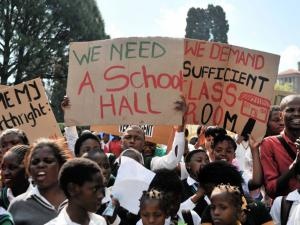
* Photo: IkamvaYouth learners picket with Equal Education outside the Union Buildings in April 2011.

The Social Entrepreneurship class of 2010 (SECP2010) recently graduated from the Gordan Institute of Business Sciences (GIBS) and among the graduates was IkamvaYouth’s Gauteng Coordinator Andrew Barrett.
What’s more, Andrew’s Action Learning Project (ALP) about “Scaling IkamvaYouth” was awarded best ALP for 2010. An executive summary of this report is listed here and if you are interested you can download it at the bottom of this article.

Andrew Barrett congratulated by Prof. Nick Binedell for best ALP on GIBS SECP 2010.
Executive Summary:
IkamvaYouth is remarkable not just in what it does but also in how it does it and central to the success of the IkamvaYouth model (so far) is the grassroots democratic emphasis that provides all IkamvaYouth stakeholders (i.e. the learners, coordinators and volunteers) with the tools to actively influence and shape their organisation.
This introductory report focuses on the challenge of scaling IkamvaYouth to achieve maximum impact while honouring the values that IkamvaYouth believes in.
In looking for solutions to this challenge there are a number of interesting examples in the theoretical literature of alternatives to a traditional (hierarchical) top-down approach and of particular interest is the fascinating Brazilian for-profit company, Semco. The democratic workplace environment espoused by Semco and the impressive results it achieves provide practical pointers of a possible way to locate power and control in the IkamvaYouth structures that will remain true to its grassroots origins.
One potential solution to the IkamvaYouth scaling challenge is to franchise the IkamvaYouth model in a way similar to that done by Habitat for Humanity and in so doing ensure that power and control remain vested at the local branch level with autonomous structures pursuing the key IkamvaYouth objectives in a way that maintains IkamvaYouth’s impressive results within a pre-defined IkamvaYouth framework.
It also appears that pursuing a non-hierarchical approach means that a type of servant leadership is inevitable and, further, that a value-based democratic organisational structure seems to offer a highly attractive option that fits this bill. It seems certain that considerations of this kind would have multiple implications for the structuring of the organisation but perhaps the most fundamental movement required is a mind-shift away from the mainstream traditional hierarchical worldview in exchange for an approach that better reflects the integrity of IkamvaYouth as a truly grassroots organisation not only in name but in structure as well.
Click here: for the full report.















 Lloyd Lungu
Lloyd Lungu